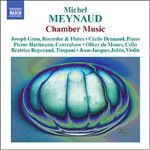
Meynaud: Chamber Music
 $25.00
Out of Stock
$25.00
Out of Stock6+ weeks add to cart
MICHAEL MEYNAUD
Meynaud: Chamber Music
Cecile Dennaud (Piano) / Joseph Grau (Flute) / Jean-Jacques Jubin (Violin) / Oliver de Mones (Cello)
[ Naxos / CD ]
Release Date: Tuesday 11 July 2006
This item is currently out of stock. It may take 6 or more weeks to obtain from when you place your order as this is a specialist product.
"My music is like a diary." Many of Michel Meynaud's works have personal references. A few titles refer explicitly to particular biographical episodes in his life - to his residences in Canada or Southern France (Malaucène) or his friends and family (Cordis Claudiae and Mecky's Chords).
"All music is song." In Michel Meynaud's philosophy of music, singing is musical expression in its natural state, an archetype of human presence. His works are permeated with melos. This affinity with song can be heard primarily in his choice of instruments for the pieces: a preference for instruments such as the violoncello and the double bass, which radiate sound "as if it is resonating out of the body". Meynaud also has a foible for solo compositions, in which the interpreter is "alone with his instrument, the notes and the music" and allowed to experience the freedom of isolation. However, Meynaud does not reduce the song to a simple Cantabile, but extends this notion to all facets of vocal articulation. The same applies to his instrumental music, where he intonates pre-verbal stammering, introverted murmuring and other affects by transforming them into sound: "comme un cri" stated in a recital direction which marked the climax of his piece Les Points d'Orgue de la Saint-Jean. These works are not only in the broadest sense of the word, singable, but also eloquent and dramatic.
"You do not need completely to rediscover music with every composition." As a dialectically thinking artist, Meynaud questions and plays with the traditional inventory of the modern without trying to destroy it. Avant-garde techniques like micro-intervals and sound effects form a natural part of his repertoire. At the same time he is also well-versed in the more traditional methods of composition. This can be heard in pieces like the Sonatine for recorder and double bass, and more especially in ¡Viva Emiliano! - which is like a resounding drama in rhetorical form. Recitative, emphatic repetitions and almost pictorially speaking characters interrupt each other in order to interfuse. The reference to Goethe in the cello sonata Faust I, incorporates the famous "Habe nun ach …" which Meynaud sees as his motto, revealing an affinity to earlier epochs. His Les Points d'Orgue de la Saint-Jean, pays homage to the Canadian province of Québec, where the history of the music becomes the subject. The allusion to the 'organ point' in the title, the hymn at the beginning and the confrontation between baroque and modern types of flutes provide a diversity of moods within the work. The same applies to the piece Chaconne from 1976 - a composition where the strict schema of baroque variations is implied at first, but then becomes gradually freed from its harmonic framework.
"My music is like a diary." Many of Michel Meynaud's works have personal references. A few titles refer explicitly to particular biographical episodes in his life - to his residences in Canada or Southern France (Malaucène) or his friends and family (Cordis Claudiae and Mecky's Chords). His works are also like entries in a diary - Meynaud bases his compositions with short texts which record personal moments or moods. These texts provide the raw material for his compositions - he transcribes the letters into notes. First of all he creates the melody, then the sound sequences from which the harmonic and rhythmic constellations are eventually created. "Glissement semantique" - "semantic gliding" - Meynaud calls this process in which the original meanings of the texts (which he later destroys) dissolve entirely into the music. Within the framework of these personal notations, even non-musical aspects accrue more meaning. Meynaud is convinced that his music is "also a political statement" - not only in pieces like ¡Viva Emiliano!, where he declares his solidarity with the revolutionary Emiliano Zapata. The works of Michel Meynaud are political, just like life is - where a single voice uplifts itself to sing.
Tracks:
Chaconne
Faust I, "Cello Sonata No. 1"
Les points d'orgue de la Saint-Jean
Sonatine for double bass
Sonatine for treble recorder and piano
Viva Emiliano!